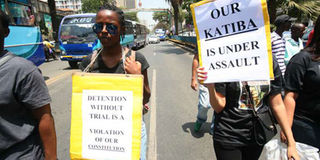Executive needs to be reminded who’s king

Activists demonstrate in Nairobi on August 27, 2015 against violation of the Constitution. It seems to me that there is serious confusion among public and State officers as to the ultimate source of the authority they exercise. PHOTO | EVANS HABIL | NATION MEDIA GROUP
What you need to know:
- This is the first Article in the Constitution of Kenya, which sets up the country’s governance system and determines how authority is exercised.
- It seems to me that there is serious confusion among public and State officers as to the ultimate source of the authority they exercise.
“All sovereign power belongs to the people of Kenya and shall be exercised only in accordance with this Constitution.”
This is the first Article in the Constitution of Kenya, which sets up the country’s governance system and determines how authority is exercised.
For instance, by operation of the Constitution, it is impossible to set Kenya up as a hereditary monarchy, since the document anoints the collective “People” as the monarch or sovereign.
The “People” are king, and cannot be overthrown unless the Constitution is changed and the “People” voluntarily give up their sovereign power to a person or family.
It behooves every public official exercising even a tiny modicum of donated power to familiarise themselves with this express injunction uttered by the sovereign, the “People”.
In my opinion, all our political and non-political leaders must be inducted into office by having to recite Article 1(1) of the Constitution over and over again, and whenever in doubt, to always err on the side of the sovereign.
After I wrote in this column on the right of ordinary Kenyans to protest and demonstrate under the protection of the State, many people wrote to me disputing this, and making several claims which have triggered my ruminations today on the source of sovereign power in Kenya.
That particular piece was inspired by police use of excessive force on protesters, which seems to be getting worse with every passing week.
Several people are reported to have been killed in the latest of the demonstrations last Monday.
In justifying the amount of force employed by the security forces, many of my interlocutors pointed out that the series of protests organised by the opposition are “illegal” for one reason or another.
Others indicated that the protesters invariably turned violent and therefore lost their constitutional rights.
One even pointed out to me that the opposition had reneged on its promise to have the demonstrations led by women carrying white handkerchiefs, and the police therefore “had no choice but to take any necessary action to disperse them” including firing live bullets at the crowds.
FIGHTING THE KING
It seems to me that there is serious confusion among public and State officers as to the ultimate source of the authority they exercise.
Police officers are wondering whether they should obey manifestly unconstitutional “shoot to kill” orders in order to keep their jobs, or to disobey them and face disciplinary action.
Members of constitutional commissions also appear conflicted, and at least one chair of such a commission has issued a statement with the pithy conclusion: “All political actors are hereby put on notice – Do not confuse Kenyans: Anarchy is not democracy. You may be confused but we are not!”
Why would a person employed to protect the king turn his guns upon his charge and kill him?
Why would a commissioner employed to further the intentions of the king enter the royal court and purport to put the king “on notice” and accuse him of being confused?
Why would a person appointed to represent the interests of the king in a deliberative assembly appear in public before the king and proceed to utter the most unspeakable insults directed at the king?
Most egregiously, a team appointed by the king to discuss security threats (to the king) recently met and made public the results of their deliberations.
In their report, they accused the king’s left hand of plotting to overthrow the king’s right hand through a “civilian coup”.
READ CONSTITUTION
The left hand is bidding to become the dominant hand, and the king’s advisers had determined that it would be a bad idea for the king to use his left hand for important Stately duties.
It follows therefore that the security forces had to use maximum force to prevent such a blatant breach of protocol, including killing the king himself, if need be.
So this Sunday I would like to urge all those in the employ of the king to go back to basics. Please read and meditate upon the first Article of our Constitution, and every time you are conflicted, just remember who is king.
Atwoli is associate professor of psychiatry and dean, School of Medicine, Moi University; [email protected]




